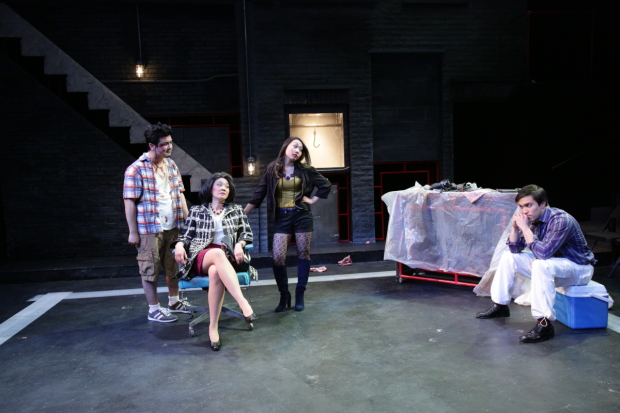Fast Company

(© Mark S. Howard)
Complicated family dynamics are a cornerstone of American drama. Carla Ching's play Fast Company, a shrug of a play that is currently running at the Lyric Stage, centers on the dysfunctional Kwan family whose loyalty is put to the test when they come together to fix a con job gone wrong. Unfortunately, this featherweight play isn't likely to leave much of an impression.
H, short for Henry (and played by Michael Hisamoto), is a talented, aloof artist with a penchant for drugs and gambling. H and his stepsister Blue (Theresa Nguyen) have cooked up a scheme involving a valuable issue of Action Comics No. 1, notable for the first appearance of Superman in the comic sphere. Blue has stolen an original copy of the comic from which H has produced a convincing fabrication. Their plan is to present the prospective buyer with the original comic for inspection, switch it out with the forged copy, and return the original to its rightful owner.
When the original copy of the comic goes missing, Blue turns to her other stepbrother, Francis (an appealing Tyler Simahk) who has given up thievery to become a David Blaine-esque escape artist and illusionist. He agrees to help her if she promises that this will be her last con. She does, but we don't believe her. When they discover that it was actually H that ran off with the comic, they call in the big gun: their formidable mother, Mabel (Lin-Ann Ching Kocar).
As the three siblings, Nguyen, Hisamoto, and Simahk carry much of the show, their committed performances are what keep things rolling. Hisamoto, in particular, has a terrific gift for physical comedy, and the confident charm of Simahk is an asset. But a play as light as this cannot survive an unconvincing central performance. As played by Kocar, the Kwan family matriarch Mabel has an emotional range that never veers too far from the center, even when it needs to most. Kocar struggles with being funny and there is an uncomfortable lack of chemistry with her costars.
While the initial conceit of Fast Company is not uninteresting, there isn't enough material here to sustain the play. Though Ching has a gift for dialogue, each scene rattles on a bit too long. The plot itself unfolds too slowly for the stakes at hand, especially despite the danger that Blue finds herself in when the comic goes missing.
The production does have its virtues in the creative team. Director M. Bevin O'Gara's kinetic staging and swift pace are appealing, and she is able to highlight a real poignancy in the fractured relationships between the siblings. Cameron Anderson's functional, back-alley-looking set and Garrett Herzig's splendid projections are at once realistic and reminiscent of something you would find on a comic book page. Tyler Kinney's costumes are thoughtful extensions of each character's personality, and the original music of Arshan Gailus adds great personality.
For a play that is supposedly an exploration of a complicated family dynamic, there is surprisingly little heart and emotion to Fast Company. But like we are told early in the play, the first rule of the job is no feelings. Clearly, Ching has taken that rule to heart.











